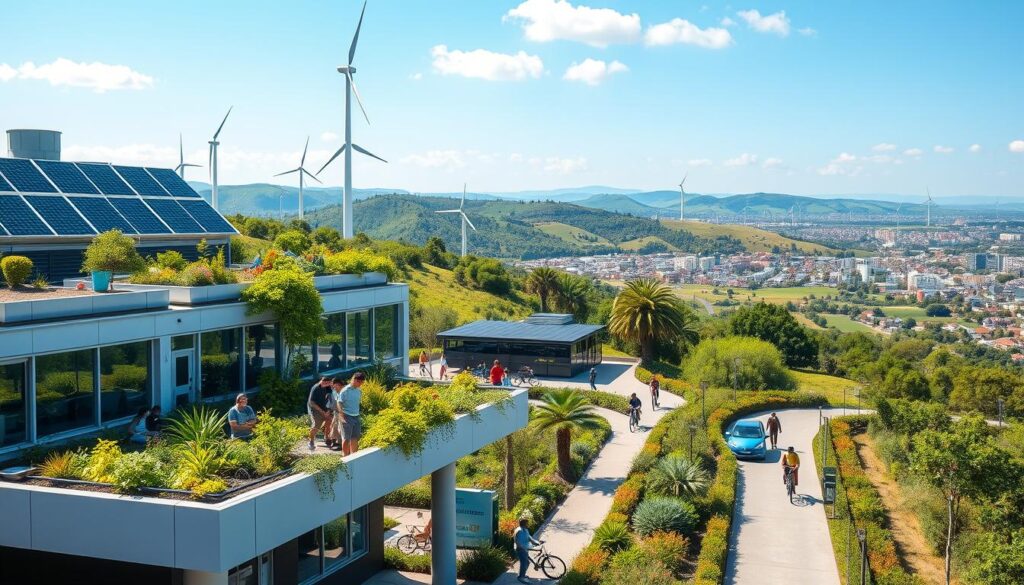
#image_title
What does it take to be a leader in sustainability? As we look ahead, companies are stepping up to meet the challenge of creating a greener future. Achieving net-zero emissions, sourcing 100% renewable energy, and adopting circular business models are now the gold standard for corporate action. These efforts are not just about protecting the planet—they’re about building resilient businesses that thrive in the long term1.
Transparent reporting and strong governance are at the heart of this transformation. Companies that openly share their progress and challenges inspire trust and set an example for others. This is the foundation of true sustainability2.
In February 2025, the Climate Champions Awards in Sarasota, FL, will celebrate these trailblazers. This event highlights the incredible work being done across industries to combat the climate crisis. It’s a reminder that every effort counts, from small startups to global corporations1.
Join us as we explore the secrets behind these sustainable successes. Discover how companies are making a difference and why their journey matters to all of us. Together, we can learn, grow, and champion a healthier planet.
Key Takeaways
- Net-zero emissions and renewable energy are key to sustainable business practices.
- Circular business models reduce waste and promote resource efficiency.
- Transparent reporting builds trust and accountability.
- Strong governance ensures long-term sustainability goals are met.
- The 2025 Climate Champions Awards celebrate industry leaders in sustainability.
Examining Core Sustainability Metrics for a Greener Future
The path to a greener future is paved with actionable metrics. Companies are now focusing on measurable goals to drive real change. These metrics not only define success but also inspire others to follow suit.
Net-Zero Emissions and Renewable Energy Goals
Net-zero emissions are a cornerstone of sustainability. Companies are committing to reduce their carbon footprint to zero by balancing emissions with removals. Over 100 countries have already set ambitious targets, showing the global effort to combat climate change3.
Renewable energy is another critical metric. Many businesses are sourcing 100% of their energy from renewable sources. This shift not only reduces emissions but also ensures long-term energy security.
Circular Business Models
Circular business models are transforming industries. These models focus on minimizing waste by reusing, recycling, and repurposing materials. For example, 103 cities from 44 countries are part of the Urban Transitions Mission, aiming to reduce emissions by over 500 MtCO2e annually by 20503.
By adopting circularity, companies can reduce their environmental impact while creating economic value. This approach is a win-win for both businesses and the planet.
Transparent Reporting and Strong Governance
Transparency is key to building trust. Companies that openly share their progress and challenges inspire confidence. For instance, Ireland’s public sector is committed to a 51% reduction in greenhouse gas emissions by 2030, with annual reporting required4.
Strong governance ensures accountability. Each public sector body in Ireland must implement a Climate Action Roadmap, aligning with national goals. This rigorous approach sets a benchmark for others to follow.
| Metric | Example | Impact |
|---|---|---|
| Net-Zero Emissions | Over 100 countries setting targets | Global emissions reduction |
| Renewable Energy | 100% renewable sourcing | Energy security and lower emissions |
| Circular Models | 103 cities in Urban Transitions Mission | Waste reduction and economic value |
| Transparent Reporting | Ireland’s public sector reporting | Accountability and trust |
These metrics are not just numbers—they represent a collective effort to create a healthier world. By focusing on these goals, companies are leading the way toward a sustainable future.
2025’s Climate Champions in Action
Behind every sustainable success story are individuals driving change. These leaders inspire others through their effort and vision. Let’s explore the remarkable contributions of three climate champions who are shaping a better future.

Profile of David Kotok and His Impact on Climate Adaptation
David Kotok, founder of the Climate Adaptation Center (CAC), has been a trailblazer in bringing climate insights to decision-makers. Over the past five years, the CAC has worked with organizations like the U.S. Federal Reserve Board to accelerate adaptation strategies5.
His leadership has helped bridge the gap between science and policy. By educating influential groups, Kotok ensures that climate risks are addressed at the highest levels. This work is critical for building resilience in the face of global challenges.
Dr. Karen Holbrook’s Contributions to Academic and Community Sustainability
Dr. Karen Holbrook has played a pivotal role in integrating sustainability into academia. At USF Sarasota-Manatee, she has hosted all CAC conferences and fostered collaborations with the Patel School of Global Sustainability5.
Her efforts extend beyond the campus. Dr. Holbrook is working on plans for a future STEM Center to enhance community engagement. This initiative will inspire the next generation to take action for a healthier planet.
AG Lafley: Transformative Leadership and Environmental Resilience
AG Lafley’s leadership at Procter & Gamble revolutionized the company’s approach to sustainability. Under his guidance, the brand portfolio was transformed, and sales more than doubled5.
At The Bay Park Conservancy, Lafley’s vision has created a “Living Laboratory” for sustainable practices. The park filters millions of gallons of water annually and mitigates storm surges through innovative design5. This project serves as a model for communities worldwide.
| Leader | Organization | Key Contribution |
|---|---|---|
| David Kotok | Climate Adaptation Center | Bridging science and policy for climate adaptation |
| Dr. Karen Holbrook | USF Sarasota-Manatee | Integrating sustainability into academia and communities |
| AG Lafley | Procter & Gamble, The Bay Park Conservancy | Driving environmental resilience and innovation |
These individuals prove that sustained effort and collaboration can drive meaningful progress. Their work inspires us all to take action for a healthier, more sustainable world.
Celebrating Community Impact and Award-Winning Sustainability
Sustainability is more than a goal—it’s a movement that unites communities and drives global change. From local initiatives to global partnerships, the effort to create a healthier world is gaining momentum. This section highlights the transformative power of collaboration and recognition in achieving lasting environmental benefits.

The Climate Champions Awards: Fostering Local and Global Change
The Climate Champions Awards, held at The Garden of Amsterdam on October 16, 2025, celebrate the best in sustainability. This ISO 20121-certified event honors leaders who have made a significant impact between June 2023 and December 20246. Categories like the Energy Transition Award and Social Impact Award highlight diverse efforts to reduce emissions and improve community health.
Winning an award not only boosts a company’s reputation but also inspires others to innovate. Over 90% of CEOs believe sustainability is essential for success, and these awards prove it7.
CAC’s Role in Driving Climate Adaptation Initiatives
For five years, the Climate Adaptation Center (CAC) has been at the forefront of climate action. By working with organizations like the U.S. Federal Reserve Board, the CAC has bridged the gap between science and policy6. Their initiatives have educated decision-makers and accelerated adaptation strategies, ensuring communities are prepared for future challenges.
Transparent reporting and community engagement are key to the CAC’s success. Their work demonstrates how local efforts can have a global impact.
Innovative Collaborations with Leading Organizations and Influencers
Partnerships are essential for addressing sustainability challenges. The CAC’s collaborations with academic institutions and regional leaders have driven meaningful progress. For example, their work with USF Sarasota-Manatee has integrated sustainability into education and community projects6.
These partnerships create a ripple effect, inspiring others to take action. As one leader noted,
“Sustainability is a team effort, and together, we can achieve more.”
- The Climate Champions Awards honor leaders in sustainability, fostering both local and global change.
- The CAC’s initiatives have driven climate adaptation, preparing communities for future challenges.
- Innovative collaborations between organizations and influencers amplify the impact of sustainability efforts.
- Transparent reporting and community engagement are essential for achieving enduring environmental benefits.
Conclusion
Building a sustainable future requires collective effort and innovation. Throughout this article, we’ve explored how companies are leading the way with measurable goals like net-zero emissions and renewable energy. These metrics define environmental leadership and inspire others to follow suit.
We’ve also highlighted inspiring individuals who are making a tangible impact. From founders to directors, their work demonstrates the power of collaboration and vision. Their stories remind us that every organization, big or small, can contribute to a healthier world.
Transparent reporting and innovative partnerships are essential for long-term success. By sharing progress openly, companies build trust and accountability. Together, we can create a greener future for our city, our country, and beyond.
Let’s take action now. Join us in adopting these gold-standard practices and championing sustainability for generations to come.
FAQ
What are the key sustainability metrics companies focus on?
How do leaders like David Kotok contribute to climate adaptation?
What role does Dr. Karen Holbrook play in sustainability efforts?
How has AG Lafley influenced environmental resilience?
What is the purpose of the Climate Champions Awards?
How does CAC support climate adaptation initiatives?
What makes collaborations with leading organizations effective?
Source Links
- Meet our Partners – Climate Champions
- Voices & Interviews – News – Climate Champions
- Uniting for Impact: Driving City Climate Action Toward a Greener Future – GCoM Secretariat Newsletter, December 2024 – Global Covenant of Mayors
- Public Sector Climate Action Strategy 2023-2025
- 2025 Climate Champions Award Ceremony
- World Sustainability Awards – Sustainability Leaders
- The Ultimate Guide to Sustainability Awards: Elevating Green Business Practices Worldwide





